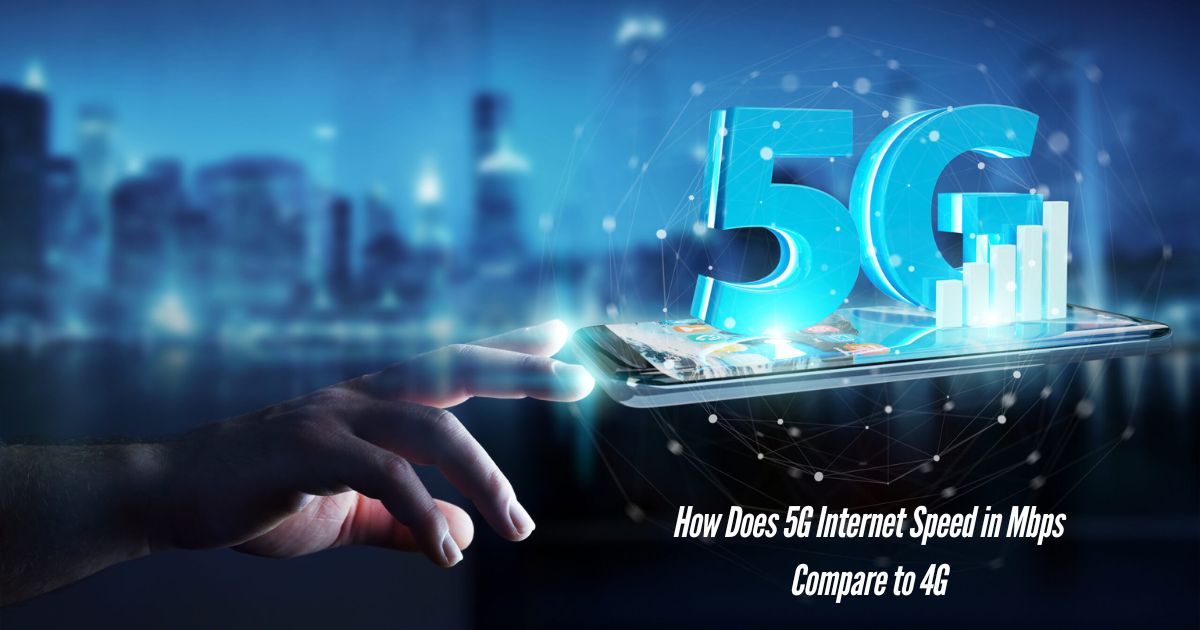Imagine downloading a high-definition movie in mere seconds or streaming 4K content without a single buffering pause. This isn’t a distant dream—it’s the promise of 5G technology. But how does 5G internet speed in Mbps compare to 4G, the network we’ve relied on for years? If you’ve ever wondered about the differences between these two generations of connectivity, you’re not alone. In this article, we’ll break down how 5G internet speeds truly stack up against 4G, why it matters for you, and what the future holds for digital experiences. By the end, you’ll know exactly how 5G redefines the meaning of speed and efficiency in our connected world.
So, buckle up and get ready to uncover the game-changing facts about 5G internet speed in Mbps compared to 4G. Ready to dive in? Let’s get started!
Understanding Mbps: The Basics of Internet Speed
Before we dive into the comparison, let’s quickly decode Mbps (megabits per second). Mbps measures how fast data is transferred from the internet to your device. For example:
- 1 Mbps: Ideal for basic web browsing.
- 10 Mbps: sufficient for streaming HD videos.
- 100 Mbps: Excellent for large downloads and multiple users.
With the introduction of 5G, the Mbps scale has reached unprecedented levels. To truly grasp the differences, let’s explore the speeds of 4G and 5G.
What Is the Average Speed of 4G?
4G has been the backbone of mobile internet for over a decade, offering significant speed improvements over 3G. Typical 4G speeds range from 20 Mbps to 100 Mbps, with peaks of up to 300 Mbps in ideal conditions. Here’s what 4G can handle:
- Streaming: seamless HD video streaming.
- Downloads: A 2GB movie downloads in about 5-10 minutes.
- Browsing: Snappy response times for most websites.
However, the real-world performance often depends on factors like network congestion, location, and device compatibility.
How Fast Is 5G Internet?
5G speeds are a quantum leap ahead of 4G, with averages ranging from 200 Mbps to 1 Gbps and peak speeds reaching a staggering 10 Gbps under ideal conditions. Here’s what 5G makes possible:
- Instant Downloads: A 2GB movie downloads in mere seconds.
- Ultra-HD Streaming: flawless 4K and even 8K streaming.
- IoT connectivity: enables smart homes, autonomous vehicles, and advanced healthcare applications.
Key Takeaway:
5G is not just faster; it’s transformative. It’s designed for a future where billions of devices are interconnected seamlessly.
Comparing 5G and 4G Speeds: A Side-by-Side Look
| Feature | 4G Internet Speed | 5G Internet Speed |
|---|---|---|
| Average Speed | 20-100 Mbps | 200 Mbps – 1 Gbps |
| Peak Speed | Up to 300 Mbps | Up to 10 Gbps |
| Latency | 50 ms | As low as 1 ms |
| Connection Density | 100,000 devices/sq km | 1 million devices/sq km |
| Use Cases | Streaming, browsing | VR, IoT, autonomous tech |
User Experience:
- 4G: reliable and sufficient for most daily needs.
- 5G: A revolution in speed, low latency, and capacity.
Advantages of 5G Over 4G
1. Blazing Speeds
5G delivers speeds up to 100 times faster than 4G, enabling lightning-fast downloads and immersive streaming.
2. Lower Latency
While 4G latency averages 50 milliseconds, 5G reduces it to as little as 1 millisecond, ensuring real-time responses.
3. Higher Capacity
5G supports far more devices per square kilometer, making it ideal for smart cities and IoT ecosystems.
4. Enhanced Reliability
5G is designed to maintain consistent performance, even in crowded areas.
5. Future-Proof Technology
5G lays the foundation for innovations like virtual reality, augmented reality, and self-driving cars.
Actionable Tips for Maximizing 5G Experience
- Upgrade Your Device: Ensure your smartphone or modem supports 5G.
- Choose the Right Plan: Opt for 5G data plans with sufficient bandwidth.
- Optimize Placement: For home setups, position your router for maximum signal strength.
- Monitor data usage: Faster speeds can quickly consume data; consider unlimited plans if needed.
Real-World Case Studies
Case Study 1: Streaming Revolution
A leading video streaming platform reported a 70% reduction in buffering complaints after adopting 5G technology.
Case Study 2: Smart Healthcare
Hospitals using 5G-enabled devices experienced a 30% increase in operational efficiency, with remote surgeries becoming a reality.
FAQs
Q1: Is 5G Internet speed in Mbps consistent worldwide? A: Speeds vary depending on infrastructure, spectrum allocation, and local regulations.
Q2: Can 4G devices access 5G speeds? A: No, 4G devices are not compatible with 5G networks. An upgrade is necessary.
Q3: Does 5G consume more data than 4G? While 5G doesn’t inherently use more data, its faster speeds can lead to higher consumption if not monitored.
Q4: Is 5G available everywhere? A: No, 5G coverage is still expanding, with availability primarily in urban and suburban areas.
Q5: How does 5G improve gaming? 5G’s low latency ensures smoother gameplay and faster response times, enhancing the overall gaming experience.
Final Thoughts
The comparison between 5G and 4G is not just about numbers; it’s about the endless possibilities that faster and more reliable connectivity brings to our lives. From revolutionizing healthcare to making our entertainment more immersive, 5G is shaping a brighter, more connected future. How does 5G internet speed in Mbps compare to 4G?
Are you ready to embrace the next generation of connectivity? Share this article with friends and family to help them understand the transformative power of 5G. And don’t forget to explore more of our insightful content for deeper dives into the world of technology. Together, let’s unlock the full potential of 5G!
